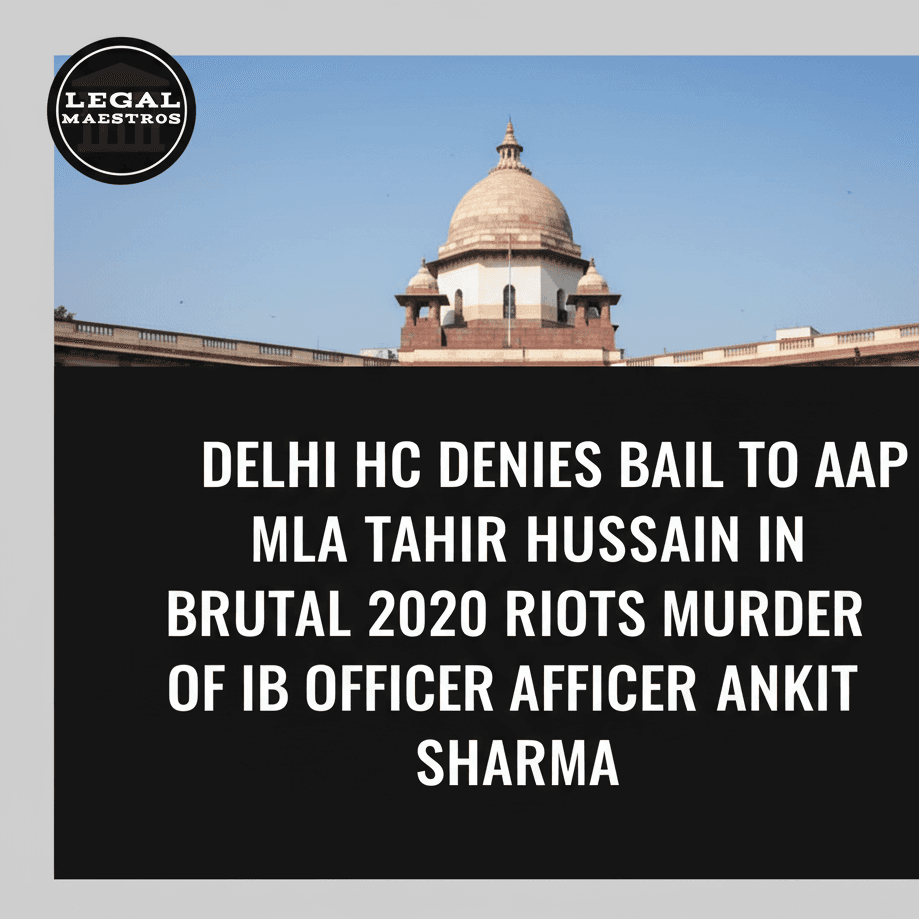
Delhi HC Denies Bail to AAP MLA Tahir Hussain in Brutal 2020 Riots Murder of IB Officer Ankit Sharma
Delhi High Court Denies Bail to Tahir Hussain in Ankit Sharma Murder Case
The decision was arrived at after listening to the submissions by both the prosecution and the defense team. It is a new move in the prolonged legal proceedings of the extensive violence that struck certain areas of the capital city. The denial of bail by the court implies that the Tahir Hussain will be kept under judicial custody as the trial proceeds as the court is taking the issues regarding the 2020 riots seriously.
The Allegations Against Tahir Hussain
One of the central figures in the case of the cause of the violence that claimed the life of Ankit Sharma is Tahir Hussain, a former corporator and elected MLA of the Aam Aadmi Party. The prosecution has put the case in a light that he was a participant in the riots because he was in his own building in Mustafabad. His property is said to have served as a platform on which his people fired stones and petrol bombs among other projectiles on the people below making the communal confrontation severe.
The accusations of Hussain are not only his participation in the riots but directly his connection with the murder of Ankit Sharma. The police enquiry had indicated conspiracy implying that Hussain had employed his powers and resources to catalyze the violence. Some of the accusations have involved shelter to rioters, handing out arms, and inciting the mob against a specific group of people which have had dire and fatal effects during those fatal days in February 2020.
For any queries or to publish an article or post or advertisement on our platform, do call at +91 6377460764 or email us at contact@legalmaestros.com.
The prosecution stated that since a person is in his position and the charges are such, he should not be put on bail. They insisted that he might play with evidence or affect witnesses in case he got out. This factor of the case made by the prosecution was instrumental to the decision of the court because the necessity to provide fair trial without any outside interference is the primary priority in such high profile and sensitive cases.
The Tragic Demise of IB Officer Ankit Sharma
Ankit Sharma was one such Intelligence Bureau employee who was killed in the middle of the 2020 Delhi riots. His body was found in a drain in Chand Bagh, a locality which was badly hit by the violence. Post-mortem examination showed a series of stab wounds, which showed that it was a very vicious and lengthy attack. His death turned out to be one of the most touching images of the stupid cruelty which devoured some parts of Delhi.
Sharma had been said to come home after his duty and was caught in the mob violence around his house. His body was found and his family had reported that he was missing. The conditions of his death especially the savagery of the injuries stunned the country and showed the magnitude of violence that had broken out in the communal fights leaving an indelible mark in the conscience and fabric of the city.
For any queries or to publish an article or post or advertisement on our platform, do call at +91 6377460764 or email us at contact@legalmaestros.com.
His assassination was one of the key aspects of the research into the bigger conspiracy of the riots. The police were careful to collect evidence which implicated different people including Tahir Hussain in the incidents that caused the untimely death of Sharma. The case is not only a criminal investigation, but also a quest of justice to a fellow citizen who was the victim of crossfiring between the two communities of hatred.
The High Court’s Rationale for Denying Bail
Also in the denial of bail, the court of Delhi saw the weightiness of the crimes, and the quality of evidence that the prosecution had put across. The court noted that there were enough reasons to suspect that Tahir Hussain had largely contributed towards the outbreak of the riots that culminated into the killing of Ankit Sharma. The judges took note of the testimonies of the witnesses and the material that was gathered in the course of the investigation and that incriminated the former MLA directly.
The possibility of the accused to abscond justice or tamper with evidence in the event of release was one of the determinants of the decision taken by the court. Since the charges raised are grave considering the fact that murder and criminal conspiracy fall under the category of crime, the court felt it necessary to make sure that the ongoing trial is conducted without any objections whatsoever. The legal evaluation was on cumulative impact of the evidence in question and this was in support of the fact that Hussain was not just present in the area of riot.
For any queries or to publish an article or post or advertisement on our platform, do call at +91 6377460764 or email us at contact@legalmaestros.com.
The court also factored in the prolific effect of the riots as well as the necessity of ensuring that people had confidence in the justice system. To set bail on such a sensitive case, particularly, where a high profile is alleged to have incited violence resulting in one of the deaths, one must be very keen. The ruling is an indication of the court that is dedicated to the law and order and dispensation of justice in a case that has rocked the community and the nation at large.
Generalized Implications of the cases of the 2020 Delhi Riots.
The refusal of Tahir Hussain to get bail by the Delhi High Court is not an isolated case but a bigger move by the judicial system to deal with the many cases that arose as a result of the 2020 Delhi riots. These riots that took place during several days left a serious mark in the social life of the capital, causing numerous damages, injuries, and more than 50 people were killed. The judicial system has been thoroughly filtering through evidence and testimonies to get the perpetrators to justice.
For any queries or to publish an article or post or advertisement on our platform, do call at +91 6377460764 or email us at contact@legalmaestros.com.
Many have been charged and arrested over the riots in relation to different incidences, including vandalism as well as murder. The court case has been complicated with a large number of FIRs and enormous evidence involved. The difficulty that the judiciary has is to ensure that all the accused are handled fairly and also offer justice to the victims and their families who had incurred great losses during the time of unrest.



![JOB POST: Junior Associate at ASM Law Chambers, Jaipur [Freshers]](https://legalmaestros.com/wp-content/uploads/2025/11/Gemini_Generated_Image_8wrxer8wrxer8wrx-768x708.png)

